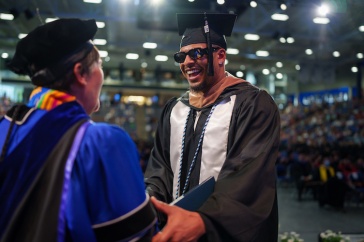
Temple Grandin, a doctor of animal science and professor at Colorado State University, bestselling author, and consultant to the livestock industry on animal behavior, spoke to an occupational therapy class on the University of New Hampshire Durham campus on Thursday, November 15, 2012.
Future occupational therapists in Shelley Mulligan’s OT Practice and Professional Roles class heard from one of the world’s most best-known people with autism recently, when Temple Grandin visited the class Nov. 15. Grandin, a prominent author and speaker on autism who is also a professor of animal science at Colorado State College, shared her insights with the OT students the day after she spoke to an overflow crowd at the MUB about “My Life in Autism.”
“Build on strengths. There’s too much emphasis on deficits,” she told the class of senior and masters-level OT majors.
In a relaxed discussion with the 75 students, Grandin freewheeled from her own life and experiences with autism, Asperger’s, and attention-deficit hyperactivity disorder (ADHD) to bullying, hugging, and recommendations for supporting young children and students on the autism spectrum. Wearing her trademark Western shirt and tie, Grandin spoke with an eloquence that belied her diagnoses and a bluntness that betrayed them.
The trouble with the autism spectrum, she said, “is at one end you’ve got half of Silicon Valley;” at the other end are people with significant intellectual and social challenges who may not be able to live independently. An autism diagnosis brings with it very uneven skills, she added, cautioning against letting a disability become one’s entire identity.
“I won’t let my autism take over,” she said, acknowledging that she wouldn’t “trade in her brain” for one without autism because she’s fond of the way it works.
Those who work with people on the autism spectrum should constantly challenge them to go farther than they believe, said Grandin, sharing an anecdote about her own skill for drawing as a child. While her passion was drawing horses, her parents stretched her by encouraging her to draw where the horse was going, or what a rider might have seen. She urged the students to look for ways to expand their clients’ strengths, perhaps with online classes or textbooks beyond grade level, and to help them with the hands-on learning and social skills that will smooth their career paths.
Grandin’s visit to UNH and to her class taught her students – many of whom will work with people on the autism spectrum – important lessons, said Mulligan, associate professor of occupational therapy.
“Seeing someone with a significant disability become successful I think is inspiring for the students, and will help to make sure that they have high expectations for what their clients, and others with challenges, can do and will achieve,” she said.
Originally published by:
UNH Today
















































